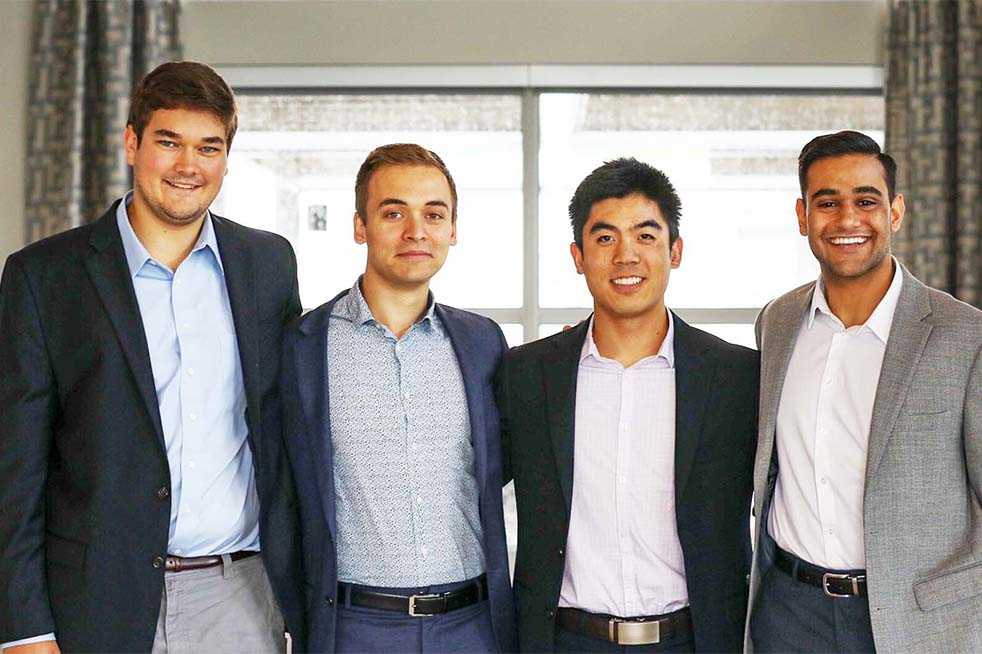When Cassidy Wang, B.S. BMED ‘18, Lucas Muller, B.S. ME ‘18, and Dev Mandavia, B.S. BMED ‘18, learned that around 30 percent of all lumbar injections fail, they knew they had found an solid topic for their senior capstone project.
The project began with a collaboration with the Mayo Clinic and has now made its way to the final rounds of the Collegiate Inventors Competition (CIC), which culminates in an all-expense-paid trip to Washington, D.C. for an exposition in November.
“There is this big problem in lumbar punctures where a large number of these procedures fail at bedside,” Wang said. “All of these are initially presented in bedside environments, so these are emergency room departments, infectious disease clinics and things like that.”
Before determining how to guide physicians to make accurate punctures, the group chose to take “a step back, and tried to understand spinal access in general,”
Wang said.
After shadowing physicians and hospital administrators and talking to patients to figure out their primary concerns, the group narrowed their focus: instead of optimizing lumbar injections in general, they would find a more accurate way to inject epidural anesthesia, which is used for mothers to ease pain during childbirth.
The project, Neuraline, combines a needle with a sensor that can find injection sites on the spine “by measuring the electrical properties and composition of the body,” and then showing a light, according to the project description on the CIC website. “A light notifies practitioners they are in the right spot. Accurately pinpointing the epidural space can help administer the epidural in about a quarter of the time,” the description concludes.
The group always intended for Neuraline to evolve from a capstone project to a full-time project. Last spring, they began applying to competitions to try to earn funding. Now, as CIC finalists, they will compete against other undergraduate innovators for a cash prize in November.
Former group members Alexander Bills, B.S. ME ‘18, and Marci Medford, B.S. BMED ‘18, left the project after graduating in Spring 2018.
Neuraline also works with CreateX, which they described as integral to transitioning the capstone to an independent venture.
However, Neuraline faced many challenges throughout the process, including access to connections with hospitals and difficulty testing their product. The group describes finding connections as an “exponential process,” as it is easier to build a network as they achieve more connections.
“I think one of the most motivating things is again how relatable it is,” Mandavia said.
Muller was impacted by his experiences meeting patients affected by epidural complications.
“Whenever we presented … there were of course professors and faculty but there were also people who had gone through these procedures before, so you would have these people come up to you and tell you that they really appreciated what you were doing because they had gone through this before and they had some personal connection to this problem,” Muller said.
Neuraline hopes to develop a complete prototype for FDA approval while searching for mentorship and funding opportunities through startup accelerators.
“Right now we’re in technical development,” Wang said.
“Our main goals are getting something that works and starting the regulatory pathway,” Mandavia said. “Long-term vision, we definitely want to make it an actual company and actually produce the products that will help people change the lives of physicians, patients and hopefully hospital administrators.”
Currently, Neuraline is projecting that their product will launch in 2020 and hopes to make a big splash in the market. 71 percent of women nationwide opt for epidural or spinal anesthesia, according to a September 2018 study published in the medical journal Anesthesiology.
“If you’re interested in innovation and making something, leverage your resources around you. It’s only because of the people around us that we’ve been able to do this,” Wang said.
